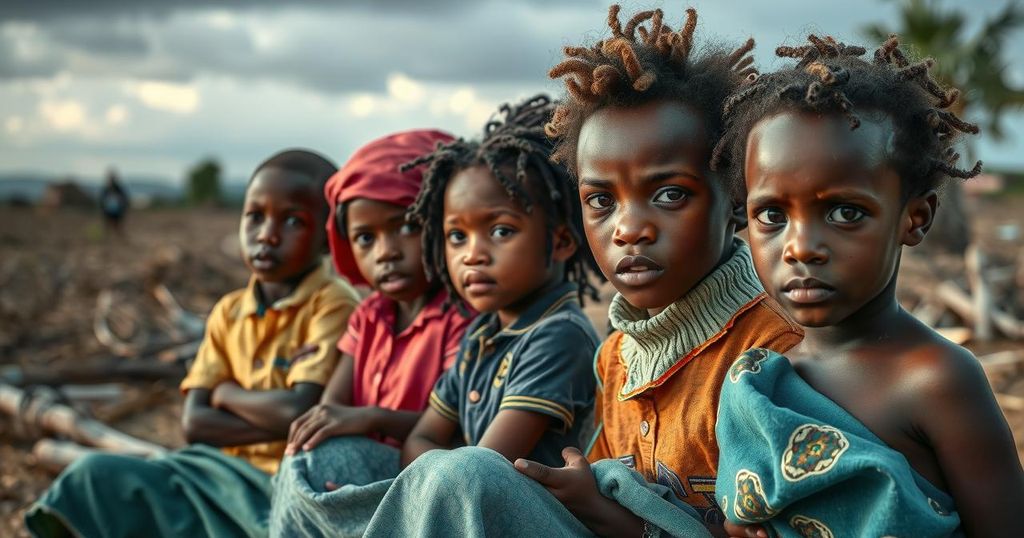More Than 22,500 Children in Northern Madagascar Prepare for Cyclone Dikeledi

Families in Northern Madagascar are preparing for Tropical Cyclone Dikeledi, expected to strike with tremendous wind and rain, putting thousands of children at risk. Save the Children emphasizes the increasing severity of such storms due to climate change and calls for increased funding and support for humanitarian efforts to protect vulnerable populations.
On January 11, 2024, children and families in Northern Madagascar are preparing for the impending impact of Tropical Cyclone Dikeledi. This storm is expected to bring severe winds, torrential rainfall, and substantial flooding, prompting mass evacuations as reported by Save the Children. The area’s meteorological services have indicated that heavy rains and strong winds are already affecting Northern Madagascar, leading to increasing concerns for the safety of residents.
Previously, the region was spared the worst effects of Tropical Storm Chido, which tragically resulted in casualties and injuries in nearby territories. With Tropical Cyclone Dikeledi being the second storm to threaten the southern African region this season, there is heightened anxiety regarding its potentially destructive path across Madagascar.
Officials from Save the Children underscore the dire situation as climatic events of this nature continue to escalate, attributing their frequency to the ongoing climate crisis. This emerging trend necessitates increased financial aid from wealthier nations to assist lower-income countries in managing the repercussions of climate change.
Tatiana Dasys, Save the Children’s Country Representative for Madagascar, expressed profound concern over the circumstances facing over 22,500 children who reside in areas projected to be affected by the cyclone. Ms. Dasys stated, “We are extremely concerned that more than 22,500 children living in areas expected to be hit by the cyclone are at risk of being displaced, losing their homes, school and possibly being injured or killed by falling objects or floods.”
Further, she noted, “From past experience, the cyclone is likely to cause extensive damage to residential areas and vulnerable yet vital public infrastructure such as schools and hospitals.” The organization anticipates heavy rainfall of up to 100 mm across the northern regions in the coming days, which could create severe flooding in susceptible areas and worsen the humanitarian crisis.
In preparation, Save the Children has positioned essential supplies in the Sava region and has enhanced community resilience, especially among schools, to better weather the cyclone’s impact. The organization emphasizes the pressing need for immediate rescue operations and humanitarian aid to safeguard lives, urging wealthier countries to bolster climate funding for those most impacted by climate-related disasters.
Save the Children has been operational in Madagascar since 2016, focusing on cash assistance and child protection initiatives, reportedly reaching over 12,700 children in 2024 alone. In a changing climate, the necessity for continued support and intervention becomes increasingly crucial to the well-being of vulnerable populations.
Tropical cyclones have increasingly posed a significant threat to Madagascar, particularly to its children and vulnerable populations. The frequency and intensity of such weather events are perceived to be exacerbated by climate change, leading to heightened rainfall and stronger winds. Previous storms, such as Tropical Storm Chido, have had catastrophic impacts on the region, resulting in loss of life and widespread suffering. As global climatic conditions evolve, organizations like Save the Children are advocating for increased financial assistance from affluent nations to help mitigate the adverse effects of these natural disasters on lower-income countries.
The imminent threat of Tropical Cyclone Dikeledi to Northern Madagascar poses a serious challenge, risking the safety and well-being of over 22,500 children. With extreme weather events on the rise, experts and humanitarian organizations stress the need for ongoing funding and support from wealthier nations. The commitment to immediate rescue operations and long-term climate resilience strategies is essential to safeguard lives and provide necessary assistance to the most affected communities.
Original Source: www.africa.com








